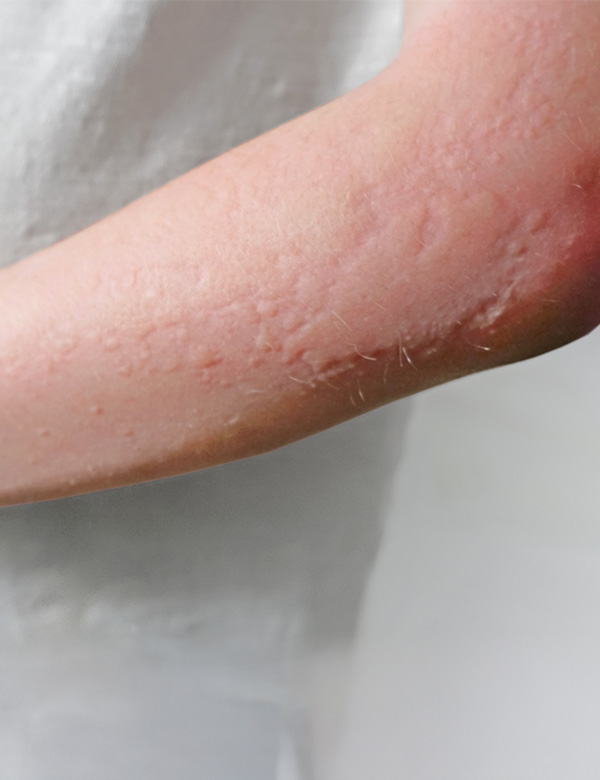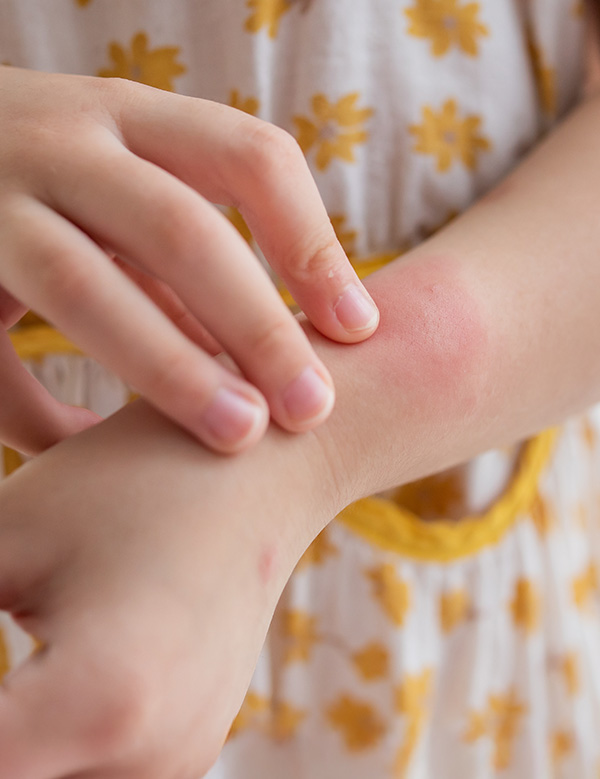Animal Hair Allergy
Identifying and treating animal hair allergy in children and adults – with an experienced allergist at Derma Medical Clinic in Zurich – Sihlcity
Animal Hair Allergy
Chronische Abszesse und schmerzhafte Knoten durch erfahrenen Hautarzt abklären und behandeln in der Derma Medical Clinic in Zürich - Sihlcity
Itchy eyes, stuffy nose or trouble breathing after contact with cats, dogs or horses – at Derma Medical Clinic, we offer precise testing and treatment
Tests
Skin prick test
Blood test if needed
Process
Initial consultation incl. allergy testing
Duration
30 minutes
What Is an Animal Hair Allergy?
Animal hair allergy is not caused by the hair itself, but by proteins in an animal’s saliva, skin flakes or urine – typically from cats, dogs or horses. These tiny particles stick to the animal’s hair and spread through the air, on clothes and into homes.
The immune system reacts to these proteins – even if there’s no direct contact with the animal. A visit to a pet owner’s home or a pillow with animal hair can be enough to trigger symptoms.
This testing is especially recommended if you …
- regularly sneeze, cough or have watery eyes after being around animals
- get breathing problems or skin reactions when visiting friends or family with pets
- suspect that your own pet is making your symptoms worse
- are unsure if animal hair is really the cause or something else might be triggering it
- want clear advice for important decisions – for example, planning a family, keeping a pet, or working with animals

What Is an Animal Hair Allergy?
Animal hair allergy is not caused by the hair itself, but by proteins in an animal’s saliva, skin flakes or urine – typically from cats, dogs or horses. These tiny particles stick to the animal’s hair and spread through the air, on clothes and into homes.
The immune system reacts to these proteins – even if there’s no direct contact with the animal. A visit to a pet owner’s home or a pillow with animal hair can be enough to trigger symptoms.
Who Should Consider Allergy Testing?
This testing is especially recommended if you …
- regularly sneeze, cough or have watery eyes after being around animals
- get breathing problems or skin reactions when visiting friends or family with pets
- suspect that your own pet is making your symptoms worse
- are unsure if animal hair is really the cause or something else might be triggering it
- want clear advice for important decisions – for example, planning a family, keeping a pet, or working with animals
Treatment
At Derma Medical Clinic, we check whether you are sensitive to animal allergens. We use a skin prick test: diluted allergen extracts (e.g. cat or dog allergens) are applied to your forearm, and the skin is gently pricked. A reaction usually appears within 15–20 minutes.
This test is painless, well tolerated and suitable for children.
If necessary, we also carry out a blood test.
If the diagnosis is confirmed, what’s next?
If an animal hair allergy is confirmed, we will discuss what steps make sense – for daily life, in contact with animals or if you already have a pet.
This may include:
- Practical allergen avoidance tips, e.g. room setup, clothing, ventilation habits
- Medication to ease acute symptoms
- In suitable cases: desensitization therapy, especially if you’re exposed to animals regularly at work or home
How Does Allergy Testing Work?
Initial conversation
We take time to understand your symptoms – or your child’s – in detail. Previous reactions and known allergies are also part of the assessment.
Skin prick test
In the skin prick test, small amounts of allergen are placed on the forearm, and the skin is gently pricked. A reaction usually appears within 15–20 minutes.
Blood test
If the skin test isn’t possible or further confirmation is needed, we take a blood sample. This can show allergy-specific antibodies and support the diagnosis.
Results & recommendations
We discuss how to reduce your exposure to animal hair and whether medication or desensitization therapy might help. You also get practical tips on adapting your home and sleeping area.

At Derma Medical Clinic, allergy treatment is provided by Dr. Markus Dendorfer, dermatologist and specialized allergist.
He has many years of experience in the diagnosis and treatment of allergic conditions – from hay fever to complex allergic reactions.

Dr. med. Markus Dendorfer
Board-certified Specialist in Dermatology & Venereology FMH
What to Expect From Us
Identifying allergies
We test specifically for animal hair allergy and help rule out other causes – even if symptoms aren’t easy to explain.
Child-friendly diagnostics & support
We take a gentle, age-appropriate approach with children and support families with clear, compassionate communication.
Practical everyday advice
We don’t stop at the diagnosis – you’ll get helpful, practical advice that works in everyday life and brings long-term relief.
Everything under one roof
You’ll receive diagnosis, medical treatment and cosmetic support all in one place. That means trusted contacts, short paths and coordinated care – from your first visit to follow-up support.
If contact with animals causes symptoms: Find out why – and what you can do in everyday life.
Book your appointment now for allergy testing at Derma Medical Clinic in Zurich – Sihlcity.
FAQ – Common Questions About Animal Hair Allergy
What is an animal hair allergy?
With an animal hair allergy, the immune system reacts strongly to certain proteins in an animal’s saliva, dander or urine – not the hair itself. These allergens stick to the animal’s hair and easily spread through clothes, furniture or the air.
What are the symptoms of an animal hair allergy?
Typical signs include:
- sneezing, blocked nose or cough
- itchy, watery eyes
- skin reactions like rash or itching
- in more severe cases: shortness of breath or asthma-like symptoms
Symptoms usually appear shortly after being around the animal or in homes with pets.
How is an animal hair allergy diagnosed?
Diagnosis involves a skin prick test. The allergen is applied and the skin lightly pricked. If a reaction occurs (e.g. swelling), sensitization is present. A blood test can also be done.
Can children have an animal hair allergy?
Yes, animal hair allergy often shows up early in children. Common signs are runny nose, sneezing, coughing or itchy eyes after playing with animals or visiting pet owners. Early testing makes it easier to spot symptoms and prevent overreactions.
What helps with an animal hair allergy?
Depending on severity:
- avoiding allergens (e.g. keeping pets out of bedrooms, changing clothes)
- medication to relieve symptoms (e.g. anti-allergy medicines)
- Desensitization for severe allergies and frequent animal contact
What is the difference between desensitization and hyposensitization?
In medical terms, desensitization and hyposensitization mean the same: a special immunotherapy where the body is gradually exposed to an allergen. The goal is to reduce or prevent allergic reactions in the long term. “Hyposensitization” is the more technical term; “desensitization” is more commonly used.
Can I live with animals despite being allergic?
It depends on the severity. In many cases, managing pets and allergies is possible with clear rules, regular cleaning and medical support. Personal advice can help decide what’s right for you.
Is an animal hair allergy curable?
The allergy usually doesn’t go away but can be controlled. Avoiding allergens, using medication and possibly desensitization can reduce symptoms a lot.
How quickly do symptoms appear after animal contact?
Symptoms often appear within minutes to hours after contact. Sometimes, just entering a room with pet hair on carpets or furniture is enough.




